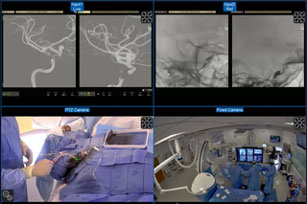Live Remote Supervision of Neuroendovascular Surgery Enabled by Olympus MedPresence®
Virtual Presence Solution Provides OR Access to Proctor Required to Oversee Critical Aneurysm Implant Procedure in New Device Trial

MedPresence® proctor view during an intracranial vascular implant case. By using MedPresence, a proctor in Canada with extensive experience placing the implant was able to supervise the procedure taking place at Lahey Hospital & Medical Center in Burlington, MA. The views were configured remotely and included a live digitally subtracted roadmap (top left) and unsubtracted (top right) images in various planes. A pan-tilt-zoom camera (bottom left) provides a view of the operator's hands and equipment and demonstrates the radial access. A fixed camera mounted to the ceiling provides an overview of activity in the room (bottom right).
Figure reproduced from Journal of NeuroInterventional Surgery, International teleproctoring in neurointerventional surgery and its potential impact on clinical trials in the era of COVID-19: legal and technical considerations, Emanuele Orru', Miklos Marosfoi, Neil V Patel, Alexander L Coon, Christoph Wald, Nicholas Repucci, Patrick Nicholson, Vitor M Pereira, Ajay K Wakhloo, Published Online First: 21 December 2020, Copyright notice 2021 with permission from BMJ Publishing Group Ltd.
CENTER VALLEY, Pa., (February 11, 2021) – Olympus announced today its cloud-based virtual medical presence platform known as MedPresence® was critical in allowing the first use in the U.S. of a novel intracranial vascular implant for treatment of a brain aneurysm. Because the device is the subject of a clinical trial, the U.S. FDA (Food and Drug Administration) required supervision of the procedure by a physician already familiar with the device, i.e., a proctor. By using MedPresence, a proctor in Canada with extensive experience placing the implant was able to supervise the procedure taking place in the neuroangiography suite at Lahey Hospital & Medical Center in Burlington, MA. This use-case is described in detail in the recent article, “International teleproctoring in neuro-interventional surgery and its potential impact on clinical trials in the era of COVID-19: legal and technical considerations,” published in the Journal of NeuroInterventional Surgery on December 20, 2020. The authors call out the potential for continued use of remote supervision (tele-proctoring), beyond COVID-19 emergency use, to increase the ability of physicians to test and train on new medical technologies without the time and logistical constraints related to proctors’ availability, case schedule, and applicable travel restrictions.
Using MedPresence, the treatment team, led by Dr. Ajay Wakhloo, Chief of NeuroInterventional Radiology at Lahey Hospital & Medical Center, was able to securely broadcast clinical information including multiple real-time advanced imaging modalities to Dr. Vitor Mendes Pereira, Professor of Medical Imaging and Surgery at the University of Toronto. In view of COVID-related travel restrictions, Dr. Pereira was unable to attend the procedure in person, but with the real-time, uninterrupted image live stream, he was able to supervise remotely the placement of three intracranial vascular implants.
“We were pleased the study showed the success of teleproctoring for this procedure using a cloud-based virtual medical presence platform. The proctor was able to reference audiovisual data at the highest quality so critical in the cerebrovascular domain from multiple sources to provide step-by-step guidance in the placement of the devices, with no delays or interruptions,” said Dr. Wakhloo.
“This study demonstrated that teleproctoring has a great potential to expand patient access to novel neurointerventional procedures and technologies, particularly in fields where specialists are few, and proctors routinely need to travel nationally or internationally in order to provide much needed training to other physicians, often resulting in delay of care,” said Dr. Emanuele Orru’, a neurointerventional radiologist at LHMC and corresponding author of the study.
In this case, high-resolution audiovisual data from the clinical sources and room-context cameras, including fluoroscopy, digital subtraction angiography, the operator’s hands, and room surroundings, were streamed to Dr. Pereira, providing him with the situational and spatial awareness he needed to supervise the procedure safely and confidently. This information was encrypted and streamed securely through the MedPresence® cloud-based system, with no protected health information transmitted or stored, consistent with HIPAA requirements.
“When we are working in microns, as we are in neurointerventional surgery, the fidelity of the image and sound provided remotely needs to be very high,” said Dr. Pereira. “The MedPresence interface provided all of the detailed information I needed to guide Dr. Wakhloo and his team during the procedure.”
Using MedPresence, specialists, senior clinicians, and technical experts can consult virtually on cases, providing accurate, well-coordinated input. Enabling features of the MedPresence platform include:
- Direct Clinical Source Data: Connects consultants outside the procedure room with clinical data sources and information, such as video from the endoscopic medical tower or C-arm.
- Immersive Two-Way Audio, Video with Telestration: Integrates clinical information with interactive capabilities, allowing collaborating teams to draw, using a stylus or fingertip, directly on the screen of any device (iPhone, iPad, PC).
- Secure, Cloud-Based Platform: Provides layers of security and privacy not available in standard web-sharing technology.
A telecollaboration platform such as MedPresence provides technical capabilities health care providers need to be able to consult with one another remotely. Being able to consult virtually allows clinicians to complete the testing and training needed to safely treat their patients using new devices.
Healthcare facilities interested in using MedPresence for teleproctoring and other telecollaboration can find more information here: https://medical.olympusamerica.com/products/medpresence
Disclosures: Wakhloo is a grant recipient of Philips Medical and serves as a consultant for Olympus and Stryker
# # #
About Olympus
Olympus is passionate about the solutions it creates for the medical, life sciences, and industrial equipment industries.
Olympus’ Medical business uses innovative capabilities in medical technology, therapeutic intervention, and precision manufacturing to help healthcare professionals deliver diagnostic, therapeutic, and minimally invasive procedures to improve clinical outcomes, reduce overall costs, and enhance the quality of life for patients. Olympus’ Medical portfolio includes endoscopes, laparoscopes, and video imaging systems, as well as surgical energy devices, system integration solutions, medical services, and a wide range of EndoTherapy instruments. For more information, visit https://medical.olympusamerica.com.


































